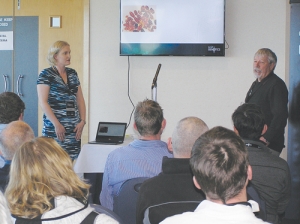Breeding Ewe Hoggets: Key tips for maximising lamb survival and farm profitability
With lamb prices at record highs, many farmers are considering breeding their ewe hoggets for the first time.
 Dr Tricia Johnson and RamGuard testing service head Neville Amyes at the recent Beef + Lamb NZ Genetics sheep breeder forum.
Dr Tricia Johnson and RamGuard testing service head Neville Amyes at the recent Beef + Lamb NZ Genetics sheep breeder forum.
Scientists are noting a geographic spread of facial eczema (FE) and urging ram breeders to start introducing tolerance into their flocks, sooner rather than later.
AgResearch animal production scientist Dr Tricia Johnson and RamGuard testing service head Neville Amyes presented a workshop to about 100 sheep breeders at this year’s Beef + Lamb NZ Genetics sheep breeder forum, held in Napier in late July. The annual forum is an opportunity for sheep breeders to interact directly with BLNZ Genetics and the scientists working in genetics.
FE affects sheep and cattle and is the result of ingesting sporidesmin produced from the fungus Pithomyces chartarum. The spores cause liver damage which directly affects production and can go on to cause photosensitivity. Spore production increases within leafy pastures in warm and humid environments. Farmers can measure pasture spores and there is testing which picks up levels of GGT produced by the liver – a specific enzyme that indicates liver damage.
Johnson says FE is spreading, geographically, and more farmers are facing production losses due to subclinical effects such as decreased growth and or lambing percentages.
The forum presentation focused on the role genetics and genomic technology could play in predicting which animals were likely to be more FE tolerant.
“Tolerance to facial eczema in sheep is highly heritable and genetic improvement can be achieved using SIL breeding values,” Johnson says.
But it can take many years to breed animals highly tolerant of the spores and it’s not cheap to do, because of the testing involved. That test is called RamGuard: animals are subjected to low levels of the FE-causing spores, before having their GGT levels tested. In this way breeders can select individual animals showing the greatest tolerance and make faster genetic progress.
Johnson believes more advanced genomic technology will allow breeders to ‘leapfrog’ progress towards FE tolerance, but testing will need to continue from that point.
“Start now for the future,” Johnson says. “Look at getting a little tolerance through your breeding programme now by buying facial eczema tolerant rams and get that through the maternal population of your flock.”
But the effort needs to be ongoing, she says. It’s not a matter of using rams one season; FE needs to be added as a trait to the breeding programme and ideally it should be accompanied by RamGuard testing to verify progress is being made.
To achieve accurate genomic predictions at least 1500 RamGuard-tested animals per sheep breed need to be genotyped using SNP chip platforms.
At least 3600 sheep have now been genotyped, but because of the 1500 per breed requirement for accuracy, only Romney predictions are considered accurate at this point. Coopworth are well on their way, with 780 animals genotyped, and Perendale have made a solid start, at 360 animals.
“In the case of Perendales, breeders have initiated a programme to boost these numbers and are now RamGuard-testing over 300 per year,” Johnson says.
As expected, Fonterra has lifted its 2025-26 forecast farmgate milk price mid-point to $9.50/kgMS.
Bovonic says a return on investment study has found its automated mastitis detection technology, QuadSense, is delivering financial, labour, and animal-health benefits on New Zealand dairy farms worth an estimated $29,547 per season.
Pāmu has welcomed ten new apprentices into its 2026 intake, marking the second year of a scheme designed to equip the next generation of farmers with the skills, knowledge, and experience needed for a thriving career in agriculture.
One team with 43 head, including a contingent from Mid Canterbury, are reflecting on a stellar NZ DairyEvent.
Fonterra farmer shareholders have approved the mechanism for a $2/share capital return expected from the sale of its global consumer and associated businesses.
Trainees in the horticulture industry studying towards a certificate or diploma can now apply for Horticulture New Zealand's (HortNZ) 2026 Industry Training Scholarships programme.

OPINION: Here w go: the election date is set for November 7 and the politicians are out of the gate…
OPINION: ECan data was released a few days ago showing Canterbury farmers have made “giant strides on environmental performance”.